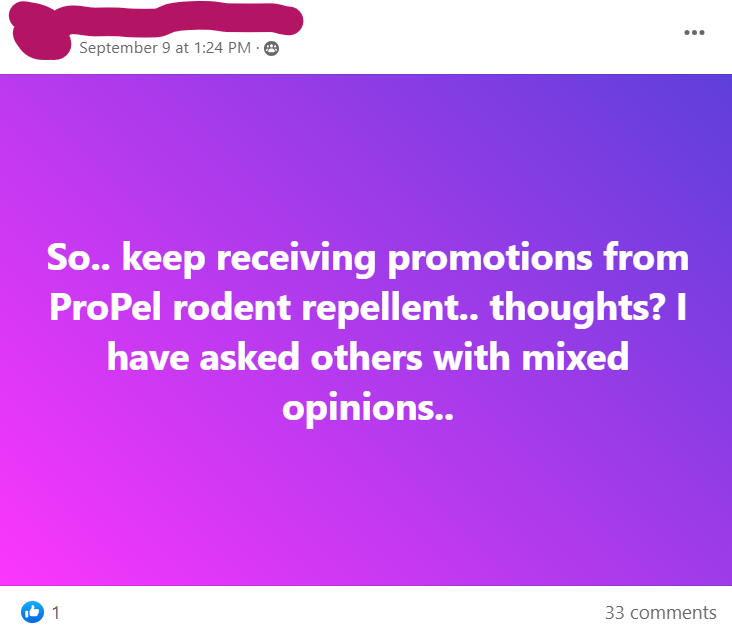Repelling the Lies (AKA: Exorcising the internet)
- Chelle Hartzer

- Sep 12, 2023
- 4 min read
All names have been removed to protect the guilty. And I’m not into public shaming. Let’s get into this.

This was an honest question and as you often see on social media, there was a lot of snarky comments and a bit of nastiness. Not the worst I’ve ever seen though. This is why you have a technical expert on hand to give you accurate, science-based, factual answers to these technical questions. Ask the general public and …well… you never know what you are going to get. Bravo to OP for asking though. Let’s say you take the most popular opinion. That’s a problem because there really wasn’t any consensus. There were some great points made and some comments that certainly weren’t helpful.
So here’s the science on this:
In a 2016 paper reviewing studies on plant secondary metabolites, they said the review “demonstrates inconsistent success across laboratory, enclosure, and field studies”. In other words, they really didn’t work.
There are many scientific articles that will “conclude” that a certain plant oil repellent will be a viable option, particularly for rodenticide replacement. There are also plenty of studies that show “efficacy” of these compounds. Reading deeper into the papers, they had to use excessively high amounts (that could be toxic to the environment) and it was often with lab mice or rats (pampered little wusses) and they gave them no incentive (food) to potentially overcome any repellency.

There is some positive research when it comes to putting repellents on items. When it comes to rodents gnawing on wires or conduits or any solid material, there is some success when using products with capsaicin in them. You could argue that this isn’t necessarily a repellent, but a learned behavior to a bad taste. That learning behavior can be interpreted as being repelled by it the next time they encounter it. These products can also be encountered by non-target organisms and negatively affect them. (I remember my dad coating the bird feeder pole with Vaseline and every pepper powder we had in the kitchen. I still feel a little bad for those squirrels that initially tried to climb it.). It’s not possible to coat all the food rodents may be eating with a repellent. It may be possible to apply to some foods to deter them from easier, better smelling foods. One study showed that one oil actually increased feeding when it was applied to their food.

Here’s my slight disclaimer. I don’t like to unnecessarily use pesticides and you can argue with me that this isn’t a pesticide because it’s 25b, but it is still a product that claims to “kill, control, repel, or mitigate” a pest issue. Using products like these, according to their label, is potentially less risky than other products. A lot of people think because they are using a “green” product that it is inherently safe, non-toxic, or environmentally friendly. NOT TRUE! Some of these products have very high concentrations of oils and other active ingredients that can be detrimental to other non-target animals and plants. Especially aquatic organisms. The attitude of “it can’t hurt anything” to use it is wrong. If there is a problem that calls for using this as either a temporary or potentially long-term control method, fine, use it. If there is no issue that these products could be used safely and effectively, don’t do it.

I’m going to get some pushback on this because there’s always the “I used it and it worked so it is the most perfect thing for everyone in all the universe” people. Yes, I’m sure there have been times when it worked however your one anecdotal story does not outweigh rigorous scientific study. Rodents do have a pretty good sense of smell so you would think some smells would repel them. We know that mice do not like the smell of human sweat or the urine of some predators. I hate zucchini and squash. While the zucchini might temporarily deter me from eating dinner, I am quickly going to find other food that is quite yummy and I’m going to go around the squash to get to my other foods. Food is the driving factor in rodent behavior and a smell of peppermint or rosemary or perfume is not going to hold up to being hungry. Plus, these products don’t have a very long residual. That smell is going to dissipate fairly quickly.
Moral of the story:
Most rodent repellents don’t work. If they do, they have limited efficacy and shouldn’t be a long term or a “one and only” treatment.
Stop asking the internet, you can hire an entomologist/rodentologist even if you aren’t ready for a full time person. Get accurate answers fast so you don’t waste time and customer satisfaction.

Many comments were on the importance of IPM and that was probably the most helpful of the remarks. Rodents have been associated with humans for tens of thousands of years. They are smart, they are sneaky, they want what we are happily leaving around for them. The war will likely continue forever, but battles can be won. It does take a mixed approach, using whatever tools are possible to deal with rodent problems, both reactively and preventative.

Lagniappe – ultrasonic devices don’t work either and here’s the science. And more science. And MORE.
Urban Pest Consulting








Comments